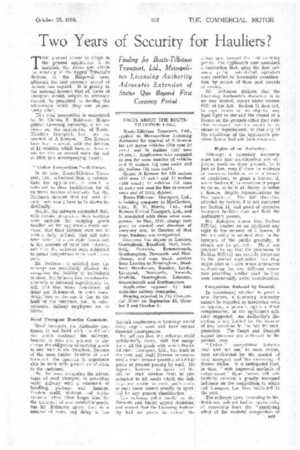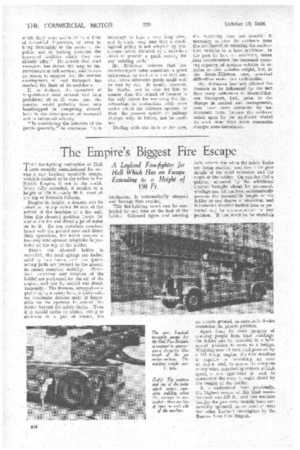Two Years of Security for Hauliers?
Page 49

Page 50

If you've noticed an error in this article please click here to report it so we can fix it.
Finding for Bouts-Tillotson Transport, Ltd., Metropolitan Licensing Authority Advocates Extension of Status Quo Beyond First Currency Period
THE prudent course to adopt in the present application is to maintain the status quo within the meaning of the Appeal Tribunal's decision in the Ridgeweli case, although the first currency period of licences has expired.It is greatly in the national interest that all forms of transport should, subject to necessary control; be permitted to develop the advantages which they can respectively offer.
This vital proposition is enunciated by Mr. Gleeson E. Robinson, Metropolitan Licensing Authority, in his decision on the application of BoutsTillotson Transport, Ltd., for the renewal of A licences. The licences have been renewed, with the deletion of 11 vehicles, which have not been in use for hire or reward since the end of-1935 (see accompanying panel).
"Unfair Competition "—Railways.
In •its case, Bouts-Tillotson Transport, Ltd., submitted that, to substantiate the application, it would be sufficient to show justification for all its trunk services collectively, but Mr. Robinson decided that the need for each route would have to be shown individually.
Briefly, the railways contended that, with certain exceptions, their facilities were suitable for carrying goods handled on the applicant's trunk services, that their services were not at present fully utilized, that rail rates were based on a principle formulated in the interests of trade and industry, and that the railways were subjected to unfair competition from road trans port. .
Mr. Robinson is satisfied that the railways are remarkably efficient. He recognizes the liability of individuals to error, but believes that merchandise generally is delivered expeditiously by rail, and that many complaints of delay are ill,founded. In some cases. delay,' loss or damage is due to the fault of the customer, but, in other instances, railway employees are to blame.
Road Transport Benefits Customers.
, Road transport, the 'Authority continues, is not faced with the difficulties which confront the railways, because . it does not attempt to discharge the obligation of carrying goods to any, place in the Kingdom. Because of the ineare limited function of road transport, the operator is sometimes able to work with greater• satisfaction to the customer.
Mr. Robinson recognizes the advantages of road transport in providing rapid delivery with a minimum of handling, package and damage. Traders could, without real inconvenience, often allow longer time for the transport of non-perishable 'goods. but Mr. Robinson agrees that, in a number of cases, any delay or loss through carelessness or breakage would delay urgent work and have serious financial consequences.
He believes that the railways could satisfactorily carry, with few exceptions, all the goods with which BoutsTillotson Transport, Ltd., has dealt in the past, and could likewise accommodate a much greater quantity of similar goods at present passing by road. He appears, however,, to agree that the use of road services must be perpetuated to fill needs which the railways are unable to meet, particularly as such cases cannot usually be specified by any general classification.
The railways relied partly on the Dunnett and Smart appeal decisions, and argued that the Licensing Authority had no power to extend the status quo beyond the first currency period. The applicant's case contained a, contention that, after the first currency period, established operators were entitled to favourable consideratiOn by reason of their past records of service. • . Mr. Robinson declares that the Licensing Authority's discretion is in no way limited, except under Section 6(2) of the Act. Section 11 does not, he says, confer on an objector any legal right to demand the refusal of a licence on the grounds either that suitable transport facilities would be in excess of requirements. or that any of the conditions of the .applicants previous licence had not been observed.
Rights of an Authority.
Although a Licensing Authority must take into consideration any objection made on these grounds, he is just as free, even if there be evidence of excessive facilities, or of a breach of conditions, to grant a licence, if, under Section 6, he considers it proper to do so, as he is at liberty to refuse a licence, despite representations by the applicant. The full discretion afforded by Section 6 is not restricted by Section 11, and proof of excessive transport facilities does not limit the Authority's powers.
Mr. Robinson denies that Section 6(2) (a) confers on an applicant any right to the renewal of a licence, if the Authority is satisfied that, in the interests of the public generally, it should not be granted. He is not prepared to say that the provisions of Section 6(2) (a) are entirely irrelevant to the present application, but they might arise in a case where alternative applications by two different operators providing similar road facilities were concurrently under consideration.
Competition Reduced by Control.
In considering whether to grant a new licence, a Licensing Authority cannot be regarded as interfering with or injuring a person's rights .without Compensation, as the applicant's solicitor suggested. An Authority's discretion is not limited by the absence of any provision in the Act for compensation. The Smart and Dunnett appeal decisions are irrelevant to the present issue.
" Unfair " competition between road and rail has, to some extent, been ameliorated by the control of road transport and the increasing of licence duties. It is anticipated that, in time, "with improved methods of enforcement," these factors will collectively exercise a greatly increased influence on the competition to which rail transport has been -subjected in the past.
The railways have, according to Mr. Robinson, not yet had an opportunity of recovering from the "paralysing effect of the wasteful competition to which they were subjected at a time of industrial depression, or even to bring thoroughly to the notice of the public and of trading concerns the improved facilities which they can already offer." He admits that road transport has shown the way to improvements in rail services, and he sees no reasor. to suppose that the modern development of road transport has reached the limit of its usefulness.
II, he declares, the operation of long-distance road services had been prohibited 10 or 114 years ago, the country would probably have been 'handicapped in competing abroad, both in the development of transport and in industrial activity.
"In considering the interests of the public generally," he continues, "it is
necessary to take a very long view, and to make very sure that a shortsighted policy is not adopted by premature acticel dictated by a mistaken effort to provide a quick remedy for any existing evils."
Mr. Robinson believes that low road-transport rates constitute a great inducement to traders to use that service, when otherwise goods co4d well be sent by rail. It would, however, he thinks, not be wise for him to assume that the refusal of licences is the only means for removing the disadvantage in connection with rates under which the railways operate, or that the present system of railway charges may, in future, not be modified.
Dealing with the facts of the case, the Authority does not consider it necessary to view the evidence from the standpoint of reducing the authorized vehicles to a bare minimum. In the past he has, on occasions, taken -info coesideration the increased carrying capacity of modern vehicles in relation to their unladen weight, but, in the Bouts-Tillotson case, practical difficulties make this undesirable.
Mr. Robinson has not allowed his decision to be influenced by the fact that many customers of Bouts-Tillotson Transport, Ltd., prior to the change in control and management, may have been attracted by uneconomic rates, because the evidence relied upon by the applicant related to work done since more reasonable charges were introduced.




























































































